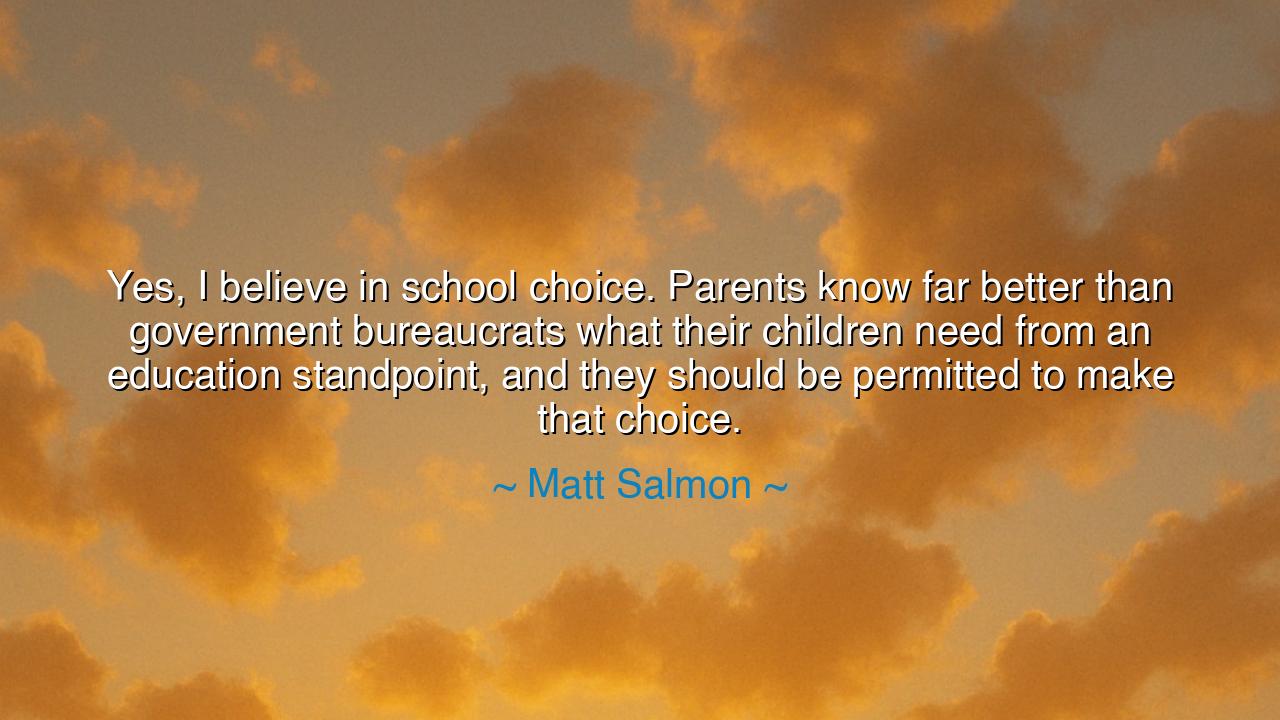
Yes, I believe in school choice. Parents know far better than
Yes, I believe in school choice. Parents know far better than government bureaucrats what their children need from an education standpoint, and they should be permitted to make that choice.






Hearken, children of learning and guardians of wisdom, to the words of Matt Salmon, who proclaimed with conviction: "Yes, I believe in school choice. Parents know far better than government bureaucrats what their children need from an education standpoint, and they should be permitted to make that choice." In these words lies a profound meditation on parental wisdom, individual responsibility, and the freedom to nurture the next generation. Salmon reminds us that education, at its heart, is not merely a matter of administration, but of love, insight, and care exercised by those who know the child best.
The origin of Salmon’s insight springs from observation of the limitations inherent in centralized educational systems. Government bureaucracies, however well-intentioned, often apply broad rules and policies that fail to account for the unique needs, abilities, and potentials of individual children. Salmon emphasizes that parents, as first teachers and lifelong guides, possess intimate understanding and insight—insight that must be honored and empowered. School choice, therefore, becomes a means to align the child’s development with the wisdom of those who cherish and know them most.
Consider the imagery of choice. To permit parents to select schools is to allow them to craft an environment in which the mind, spirit, and character of their children may flourish. It is an acknowledgment that education is not a one-size-fits-all endeavor, but a personalized journey requiring guidance, observation, and deliberate cultivation. Salmon’s words remind us that freedom in learning nurtures talent, curiosity, and virtue, just as a gardener chooses the soil, sunlight, and water best suited to each plant.
History provides vivid exemplars of the power of parental engagement and choice. In ancient Athens, the role of the paideia—education in virtue, knowledge, and civic skill—was shared between family and state, yet parents often guided the early formation of character and intellect. Similarly, in Renaissance Florence, families who selected tutors, mentors, and schools tailored to their children’s abilities produced prodigious thinkers, artists, and leaders. These examples illuminate Salmon’s assertion that the intimate knowledge of guardians is indispensable in shaping the next generation.
Salmon’s reflection is also a meditation on the limits of centralized authority. Bureaucracies, by necessity, standardize, simplify, and codify, yet the richness of human talent and curiosity cannot always conform to uniform metrics. The heart of education lies not in regulation alone, but in fostering conditions for individual growth. Allowing parents to exercise choice bridges the gap between the universal and the particular, between public policy and private insight.
The lesson is timeless: education thrives when freedom, responsibility, and personal insight are honored. Parents, empowered to choose wisely, become active participants in cultivating intellect, character, and virtue. The child, in turn, benefits from a learning environment tailored to their unique abilities and needs, producing citizens capable not only of knowledge, but of judgment, creativity, and moral discernment. Salmon reminds us that liberty in education is a cornerstone of both individual and societal flourishing.
Practical actions emerge naturally: support policies and initiatives that expand educational choice; engage deeply in understanding the needs, talents, and passions of children; collaborate with educators to ensure environments align with both learning goals and moral development; and advocate for systems that respect the wisdom of parents while maintaining high standards of opportunity and equity. By doing so, one ensures that education serves the child, guided by those who know them best, rather than being constrained by distant bureaucratic mandates.
In sum, Salmon’s words illuminate a profound truth: the stewardship of children’s minds and hearts is best entrusted to those who know them intimately. Governance, policy, and administration serve as instruments, but the guiding hand must belong to parents, mentors, and guardians. Let this lesson inspire both citizens and leaders alike, nurturing a society where freedom, insight, and love together cultivate generations capable of wisdom, virtue, and greatness.
If you wish, I can craft an even more epic, mythic version, turning Salmon’s reflection into a heroic narrative of parental guidance, freedom in learning, and the cultivation of human potential—perfect for immersive audio storytelling. Do you want me to do that?






AAdministratorAdministrator
Welcome, honored guests. Please leave a comment, we will respond soon